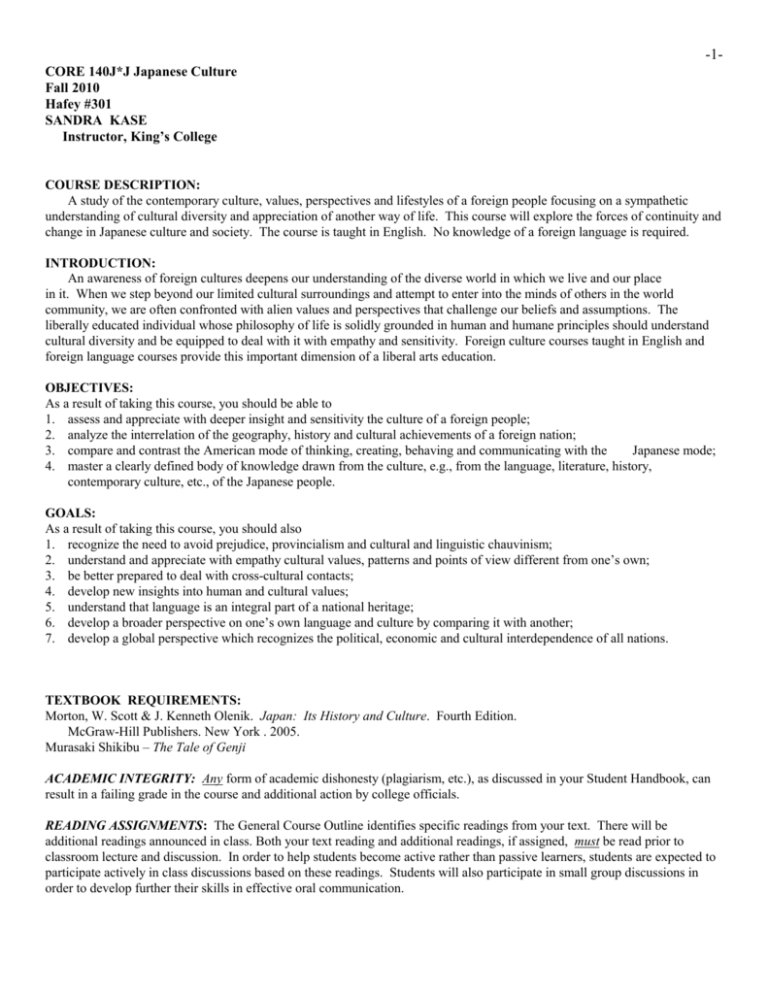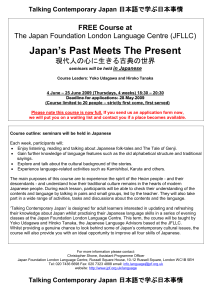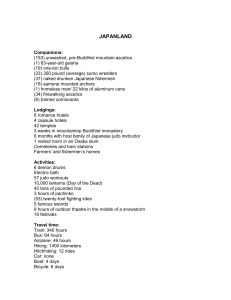CORE 130G - AMERICAN CIVILIZATION
advertisement

-1CORE 140J*J Japanese Culture Fall 2010 Hafey #301 SANDRA KASE Instructor, King’s College COURSE DESCRIPTION: A study of the contemporary culture, values, perspectives and lifestyles of a foreign people focusing on a sympathetic understanding of cultural diversity and appreciation of another way of life. This course will explore the forces of continuity and change in Japanese culture and society. The course is taught in English. No knowledge of a foreign language is required. INTRODUCTION: An awareness of foreign cultures deepens our understanding of the diverse world in which we live and our place in it. When we step beyond our limited cultural surroundings and attempt to enter into the minds of others in the world community, we are often confronted with alien values and perspectives that challenge our beliefs and assumptions. The liberally educated individual whose philosophy of life is solidly grounded in human and humane principles should understand cultural diversity and be equipped to deal with it with empathy and sensitivity. Foreign culture courses taught in English and foreign language courses provide this important dimension of a liberal arts education. OBJECTIVES: As a result of taking this course, you should be able to 1. assess and appreciate with deeper insight and sensitivity the culture of a foreign people; 2. analyze the interrelation of the geography, history and cultural achievements of a foreign nation; 3. compare and contrast the American mode of thinking, creating, behaving and communicating with the Japanese mode; 4. master a clearly defined body of knowledge drawn from the culture, e.g., from the language, literature, history, contemporary culture, etc., of the Japanese people. GOALS: As a result of taking this course, you should also 1. recognize the need to avoid prejudice, provincialism and cultural and linguistic chauvinism; 2. understand and appreciate with empathy cultural values, patterns and points of view different from one’s own; 3. be better prepared to deal with cross-cultural contacts; 4. develop new insights into human and cultural values; 5. understand that language is an integral part of a national heritage; 6. develop a broader perspective on one’s own language and culture by comparing it with another; 7. develop a global perspective which recognizes the political, economic and cultural interdependence of all nations. TEXTBOOK REQUIREMENTS: Morton, W. Scott & J. Kenneth Olenik. Japan: Its History and Culture. Fourth Edition. McGraw-Hill Publishers. New York . 2005. Murasaki Shikibu – The Tale of Genji ACADEMIC INTEGRITY: Any form of academic dishonesty (plagiarism, etc.), as discussed in your Student Handbook, can result in a failing grade in the course and additional action by college officials. READING ASSIGNMENTS: The General Course Outline identifies specific readings from your text. There will be additional readings announced in class. Both your text reading and additional readings, if assigned, must be read prior to classroom lecture and discussion. In order to help students become active rather than passive learners, students are expected to participate actively in class discussions based on these readings. Students will also participate in small group discussions in order to develop further their skills in effective oral communication. -2WRITTEN ASSIGNMENT/PRESENTATION Students will prepare an argumentative essay in order to apply and to develop further their skills in critical thinking and effective writing. Students will also explore print and Internet information resources for studying contemporary events by being assigned to analyze a specific social, political, or economic issue in contemporary Japan. This analysis will also be presented orally. ***Handwritten work will NOT be accepted. VIDEO/POWER POINT PRESENTATIONS: There will be a significant number of video/power point presentations throughout the semester. It is your responsibility to arrive on time and view each video as they will reinforce your understanding of the specific topic we are covering. References to the content of these videos will be on each of the exams. TESTS: There will be three (3) written tests given during the semester including the final examination. The tests will be based on the lectures and text reading materials, as assigned. Each test will be non-comprehensive and will review the most recent materials covered. CURRENT EVENT JOURNAL: Each week students will check local and national news along with the attached websites to gain a knowledge of current events and issues taking place in Japan. Each student will record a synopsis of an article (your choice) giving the date, source, and a short explanation of that issue. Also include your own comments as a conclusion. ***Journals of ten (10) articles will be submitted on Tuesday, November 23. ATTENDANCE: Students are expected to attend all classes. In the case of an excused absence from class, it is the responsibility of the student to contact the faculty member regarding assignments and materials distributed. Rules of the College regarding class attendance will be followed strictly. Students arriving after the roll is taken will be marked absent and must meet with the professor after class if they wish to have the absence changed. Absence on the day of a scheduled test will NOT be excused unless a serious reason has been explained to the instructor (in advance, if possible) and arrangements for a make-up test are made within five (5) class days of the scheduled test. It is the RESPONSIBILITY OF THE STUDENT to arrange the make-up with the professor. It will be within the discretion of the professor to permit any and all exceptions to these rules based on the evidence presented. MOODLE Moodle will be used during this semester for assignments, tests, paper due dates, and any other pertinent information that you might need. This will also be the place to check out class cancellations or any special instructions for changes caused by unexpected circumstances. We might also use it for discussion, quizzes, etc. as the semester proceeds. CHECK IT DAILY – MORNING AND EVENING! SEMESTER GRADE EVALUATION: The determination of the final semester grade will be based on the successful completion of all requirements for the course using the values as follows: 3 Exams @ 20% each = 60% Contemporary Presentation 20% Attendance & Class Participation 10% Current Event Journal 10% GRADING SCALE: The general grading scale to be used is as follows: A = 95 A- = 92 B+ = 88 B = 85 B- = 82 C+ = 78 C = 75 C- = 72 D+ = 68 D = 60 F = Below 60 OFFICE CONTACT/OFFICE HOURS *Personal consultations are welcome and encouraged during office hours. Office: A430 – Desk 5 Office Hours: T/Th 1:00 p.m. to 2:00 p.m. by appointment (until further notice). Phone: 208-5900 Ext.5952 Cell Phone: 885-1856 (preferable) E-mail: sandrakase@kings.edu -3GENERAL COURSE OUTLINE: TOPICS and READINGS (This schedule is tentative and is subject to amendment by the instructor.) August 31 Syllabus and Class expectations Pre-Assessment: Who Are the Japanese? Introduction: Ethnocentrism History of Japan: Its History and Culture [Morton - pgs. 1-189] The Origins and Early History of the Japanese (Video) (Morton - pgs 1-15) September 6 Labor Day (no classes) September 7, 9 Influence of History: Shinto, Buddhism, and Confucianism(Video) handouts September 14, 16, 21 Influence of History: Shogun, Daimyo and Samurai Culture(Video) handouts Bushido September 23, 28 The Opening of Japan to the West / The Winds of Change: Entry into Global Affairs (Morton – pgs. 134-178) September 30 EXAM #1 October 5, 7 Japanese Aesthetics October 14 – 17 Fall Break October 12, 19, 21 The Literary Tradition Haiku poetry (handout) Japanese Folk Tales (handout) The Tale of Genji Modern Japanese Stories (handout) October 26, 28, November 2 Visual & Performing Arts The Japanese Tea Ceremony No, Kabuki, and Bunraku November 4, 9 Japanese Film November 11 EXAM #2 September 2 November 16, 18 November 24 – 28 November 23, 30 thru December 2, 7 December 9 PRESENTATIONS BEGIN: Japanese Culture and Contemporary Political Issues Thanksgiving Recess Japanese Culture and Contemporary Business and Economic Issues Japanese Culture and Contemporary Social Issues Various topics Last Class Post-Assessment: Who are the Japanese? December 13 - 17 FINAL EXAMS (EXAM #3) IMPORTANT DATES TO REMEMBER Fall Break: Thursday, October 14 thru Sunday, October 17 Current Event Journals Due on Tuesday, November 23 Thanksgiving Recess: Wednesday, November 24 thru Sunday, November 28 Final Grades Due: Monday, December 20 -4- WEB SITES FOR CONTEMPORARY ISSUES OF JAPAN NEWS: http://www.japantimes.co.jp http://www.yomiuri.co.jp/index-e.htm http://mdn.mainichi-msn.co.jp http://www.asahi.com/english/english/html http://www.atimes.com/japan-econ/japan-econ.html INFORMATION: http://www.japantoday.com http://web-japan.org GOVERNMENT: http://www.kantei.co.jp/foreign Official website of Prime Minister Koizumi http://www.mofa.go.jp Minister of foreign affairs http://www.us.emb-japan.go.jp/english/html/index.html U.S. Embassy








